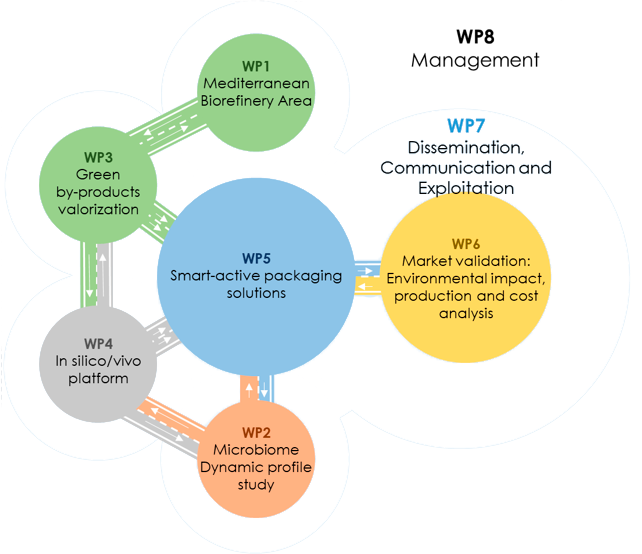
Shelf-life Enhancing Packaging Systems for Mediterranean Food through Innovative and Circular Solutions Based on Agri-Food Multi-Product Cascade Biorefinery
WORKPLAN
Bridging Vision to Execution

Towards the development of local biorefineries in the mediterranean area from agri-food by-products to obtain circular bio-based packaging and natural antimicrobial agents
June 2024-November 2024 / Led by MOHAMMED VI POLYTECHNIC UNIVERSITY
OBJECTIVES
To comparatively evaluate a large number of agricultural by-products from the typical Mediterranean area for their potential valorisation by biorefinery processes for the production of bioactive compounds and biopolymers
To select the most suitable agricultural by-product for further biorefinery process development
To develop a socioeconomic strategy for the implementation of a Mediterranean Biorefinery Area for the implementation of small-scale local modular biorefineries
Characterising dynamics of food microbiota: impact of abiotic factors and packaging conditions of the targeted food chains
June 2024 – May 2027 / Led by UNIVERSITY OF TURIN
OBJECTIVES
To characterise the composition and functionalities of microbial communities in the selected food products
To identify beneficial core composition of microbiome/microbiota for the selected food products
To recover, preserve and exploit microbial communities that are associated with the quality of the selected food products
Development of sustainable, simple, and scalable biorefinery processes for separation and extraction of biopolymers and active compounds from agricultural by-products
December 2024-November 2025 / Led by UNIVERSIDAD DE CÓRDOBA
OBJECTIVES
- To obtain microbial consortia, bioactive compounds and biopolymers from agricultural by-products to be supplied to WP5 for packaging systems demonstrator development
- To optimise the parameters and design of extraction processes to be assembled in small-scale modular biorefineries
Development and application of an in vitro/in silico platform as a novel test bench for screening bioprotective microbial consortium and bioactive compounds enhancing shelf-life and ensuring food safety.
June 2024 – January 2027 / Led by UNIVERSIDAD DE CÓRDOBA
OBJECTIVES
- To formulate and optimise food model systems mimicking food properties to study the microbial response in the targeted food products
- To develop a high-throughput testing platform to study, in vitro, microbial interactions under different food-simulated conditions
- To advance in an modelling approach to simulate interactions of bioprotectors and target (pathogen/spoilage) microorganisms in complex communities of food ecosystems
- To create a predictive platform integrating observations and simulation models to screen and optimise beneficial microbial communities and bioprotective microorganisms
- To provide optimal candidates of microbial communities, bioprotective cultures, bioactive compounds and biopolymers for application in bio-based active packaging systems
Bio-based integrated active packaging solutions featuring antimicrobial properties for the food industry: development, optimisation and formulation.
August 2025 – November 2026 / Led by PACKBENEFIT
OBJECTIVES
Developing microbiome-guided active packaging demonstrators through the synergistic combination of biopolymers, bioactive compounds and functional microbial consortia:
- To develop rigid fibre-based trays with biopolymers and bioactive compounds from WP3
- To develop bio-based films for using biopolymers and bioactive compounds from WP3
- To develop synbiotic edible coatings to synergistically increase nutritional properties and shelf life with microbial consortia, biopolymers and bioactive compounds from WP3
- To develop absorbent bioactive food pads using biopolymers and bioactive compounds from WP3
- To develop on-package smart halochromic freshness/spoilage-sensitive labels using biopolymers from WP3
Piloting and assessment of the bio-based packaging solutions: environmental, production and cost analysis
March 2026 – May 2027 / Led by GTE
OBJECTIVES
- To increase shelf-life, strengthen quality and nutritional properties of food products
- Evaluate feasibility and impact of bio-based packaging solutions across postharvest stages
- Analyse environmental impact and shelf-life extension compared to existing systems
- Identify added value for producers and consumers through market studies
- Assess suitability and adoption among stakeholders for seamless integration
- Develop circularity analysis and Life Cycle Assessment (LCA) for environmental impacts
- Conduct Life Cycle Cost (LCC) analysis for economic feasibility across the value chain
Communication, dissemination and exploitation of the advences and technologies of the active microbiome-based food packaging developed in biomedpack
June 2024 – May 2027 / Led by UNIVERSITÉ DE SFAX
OBJECTIVES
- Elaboration of a Dissemination and Communication Plan
- Development of training and educational programs to transfer BIOMEDPACK’s know-how to interested agents
- Promotion of networking in the field of bio-based and active food packaging
- Raising awareness of the advantages of the technologies and solutions developed for the reduction of food waste
- Development of an Exploitation Plan and business model based on BIOMEDPACK’s innovations
- Dissemination and Communication of BIOMEDPACK’s results to stakeholders
Management
June 2024 – May 2027 / Led by UNIVERSIDAD DE CÓRDOBA
OBJECTIVES
- Coordinate and manage the project to efficiently achieve the expected objectives on time and with optimal utilisation of the resources
- Coordinate and facilitate integrated involvement of partners in the different WPs, ensuring an efficient communication flow, and foreseeing adaptation to possible unexpected contingencies
- Establish an effective steering approach to ensure a cohesive project implementation based on the partnership within the consortium, foster interconnections with external stakeholders, and maintain strong communication with the EC
- Timely reporting, and legal, financial, and administrative aspects management in line with international and EC standards
- Design and implementation of a Data Management Plan and IPR Strategy